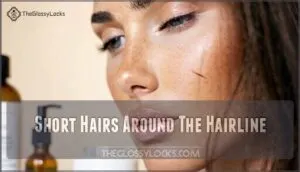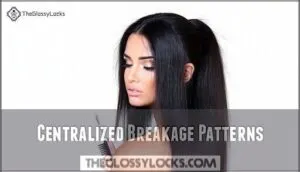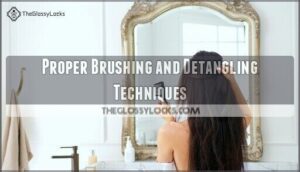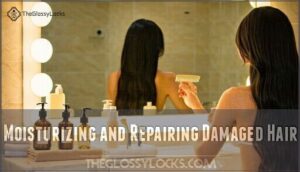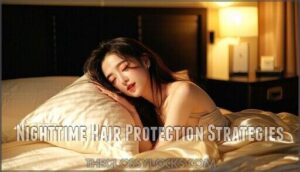This site is supported by our readers. We may earn a commission, at no cost to you, if you purchase through links.
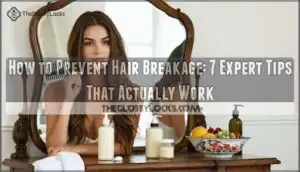
Always apply heat protectant before styling and space chemical treatments 8-10 weeks apart. Focus on nutrition too—zinc, iron, and protein strengthen hair from within. Deep condition weekly and trim every 6-8 weeks to stop split ends from traveling up the shaft. These simple changes tackle the root causes that turn healthy hair into a brittle mess.
Table Of Contents
- Key Takeaways
- What Causes Hair Breakage?
- How to Tell if Your Hair is Breaking
- Nutrition Tips to Prevent Hair Breakage
- Daily Hair Care Habits for Stronger Hair
- Minimizing Heat, Chemical, and Environmental Damage
- Moisturizing and Repairing Damaged Hair
- Nighttime Hair Protection Strategies
- Frequently Asked Questions (FAQs)
- How can I prevent hair breakage?
- What are the ways to stop hair fall?
- Can hair care products prevent hair breakage?
- How to repair hair breakage?
- How do I stop my hair from breaking?
- What is the main cause of hair breakage?
- Why does my hair break apart so easily?
- How do you restore hair breakage?
- How often should I trim my hair?
- Can sleeping positions affect hair breakage?
- Conclusion
Key Takeaways
- Switch to gentle hair care basics – Use sulfate-free shampoos with lukewarm water, detangle wet hair with wide-tooth combs starting from the tips, and replace rough towels with microfiber wraps to prevent daily damage.
- Protect your hair from heat and chemicals – Always apply heat protectant before styling, space chemical treatments 8-10 weeks apart, and use silk scrunchies instead of regular hair ties to reduce mechanical stress.
- Feed your hair from within – Focus on getting enough zinc, iron, and protein in your diet since nutrient deficiencies directly weaken hair structure and increase breakage from the follicle level.
- Create a protective nighttime routine – Sleep on silk pillowcases to reduce friction, deep condition weekly to restore moisture, and trim every 6-8 weeks to stop split ends from traveling up the hair shaft.
What Causes Hair Breakage?
Hair breakage happens when your strands become weakened by daily habits like over-brushing, tight ponytails, and unprotected heat styling.
You’re also damaging your hair from the inside out if you’re not getting enough protein, iron, and other essential nutrients your follicles need to stay strong, which can be prevented by avoiding habits like over-brushing.
Over-Brushing and Tight Hairstyles
Although over-brushing seems like good hair care, you’re actually damaging your strands when you exceed 100 strokes daily. Your hair breakage prevention starts with gentle detangling using wide-tooth combs on wet hair, working from tips upward.
Tight hairstyle risks include ponytails and braids that stress your hairline, reducing hair elasticity. Choose soft hair tying methods like scrunchies instead of rubber bands for healthier hair styling tools practices.
Understanding the causes of hair breakage issues is essential to preventing further damage and promoting healthy hair growth.
Unprotected Heat Styling and Rough Towel-Drying
Heat styling without protection strips moisture from your hair shaft, causing breakage and split ends. Blow drying on high heat or using flat irons above 300°F damages the cuticle permanently. Rough towel-drying creates friction that weakens wet hair strands.
Apply heat protectant sprays before styling and gently squeeze hair with microfiber towels instead.
Poor Diet and Stress
Behind every strand of broken hair lies a story of nutrient deficiency and chronic stress. Your body prioritizes essential organs over hair follicles when resources run low, making healthy eating and stress management essential for strong strands.
- Iron, zinc, and biotin deficiencies directly cause increased hair breakage causes
- Chronic stress disrupts growth cycles, weakening your hair’s natural structure
- Hair supplements can fill nutritional gaps when your balanced lifestyle needs support
How to Tell if Your Hair is Breaking
Spotting hair breakage isn’t always obvious, but three key signs reveal what’s happening to your strands.
You’ll notice short, uneven hairs sprouting around your hairline, visible split ends when you examine individual strands, and specific areas where breakage clusters together.
Short Hairs Around The Hairline
You’ll notice tiny, wispy strands framing your face when hair breakage targets your hairline. These stubborn short hairs signal that your edges need immediate attention for hairline repair and edge growth recovery.
| Breakage Signs | What It Means |
|---|---|
| Baby hairs breaking off | Mechanical damage from tight styles |
| Uneven hairline texture | Chemical or heat damage to follicles |
| Patchy thinning edges | Poor short hair care routine |
Split Ends and The Strand Test
Split ends reveal themselves as tiny forks at your hair’s tips, while strand testing helps you assess overall breakage patterns. This simple DIY hair fiber analysis can guide your fragile hair repair strategy:
- Gently stretch a single strand between your fingers
- Apply light pressure to test elasticity
- Look for immediate snapping or white breakage points
- Check multiple sections for thorough breakage treatment assessment
Split end prevention starts with recognizing these telltale damage signs early, using split end prevention.
Centralized Breakage Patterns
When breakage occurs in specific areas, you’re dealing with concentrated damage zones that reveal underlying causes. Crown breakage often signals excessive heat styling or tight ponytails, while nape breakage indicates friction from collars or pillows.
Temple breakage typically stems from harsh brushing or headband pressure. Parting breakage develops from repeated styling in the same spot, and perimeter breakage suggests chemical damage or over-manipulation during detangling sessions, which can be associated with over-manipulation.
Nutrition Tips to Prevent Hair Breakage
Your hair needs specific nutrients to stay strong and resist breakage, just like your body needs fuel to function properly.
The right combination of vitamins, minerals, and proteins can transform brittle strands into resilient hair that withstands daily styling and environmental stress, providing your hair with what it needs to become resilient hair.
Importance of Zinc, Iron, and Folic Acid
Your hair’s strength depends on three key minerals that work together like a well-oiled machine. Zinc benefits include supporting protein structure and preventing premature follicle regression, while iron supplements help carry oxygen to your scalp for healthy hair growth. Folic acid role involves DNA synthesis in follicle cells, creating stronger strands.
Nutrient deficiency in these minerals triggers breakage, but maintaining proper mineral balance through targeted hair nutrition advice restores your hair health naturally. Understanding the role of zinc supplementation is vital for preventing hair breakage and promoting overall hair health.
Protein and Antioxidants for Strong Hair
Building blocks of strong hair come from within through strategic nutrition choices. Protein serves as your hair’s foundation since strands consist of keratin protein, while antioxidant rich foods combat free radicals that weaken follicles and accelerate hair damage prevention.
Essential protein sources for hair fortification include:
- Lean meats and fish providing complete amino acid benefits
- Legumes and quinoa offering plant-based protein options
- Greek yogurt supporting nutrient absorption and scalp health
- Eggs delivering biotin alongside high-quality protein
- Protein supplements like collagen powder for targeted hair strengthening
This nutritional foundation directly impacts hair growth cycles and reduces hair breakage substantially.
Essential Vitamins and Hydration
Beyond protein, specific vitamins fuel your hair’s growth engine while proper hydration keeps strands flexible. Vitamin deficiency weakens follicles, but maintaining mineral balance through adequate water intake supports nutrient absorption.
Here’s how essential nutrients work:
| Vitamin | Hair Health Benefit | Daily Source |
|---|---|---|
| Vitamin A | Promotes sebum production | Sweet potatoes, carrots |
| Vitamin C | Boosts collagen synthesis | Citrus fruits, berries |
| Vitamin D | Supports follicle health | Sunlight, fatty fish |
Understanding vitamin deficiencies is vital for preventing hair breakage. Remember: healthy oils help moisturize while vitamin supplements can fill gaps in your diet.
Foods and Supplements for Hair Health
Smart food choices fuel stronger strands from within. Your hair craves specific nutrients that you can easily incorporate through targeted nutrition and strategic supplementation for ideal hair health maintenance.
- Protein powerhouses: Eggs, Greek yogurt, and legumes deliver essential amino acids for keratin production and reduced hair growth treatment needs
- Omega rich foods: Salmon, walnuts, and flaxseeds provide healthy oils that maintain scalp moisture and strand flexibility
- Hair minerals: Oysters, spinach, and pumpkin seeds supply zinc and iron to combat breakage at the follicle level
- Antioxidant benefits: Blueberries and bell peppers protect against environmental damage while supporting nutrient dense diets and natural hair health tips
Daily Hair Care Habits for Stronger Hair
Your daily hair care routine makes the difference between strong, healthy strands and brittle hair that snaps at every touch.
Simple changes to how you wash, brush, and handle your hair can dramatically reduce breakage and improve overall hair strength.
Gentle Shampooing and Conditioning
Proper shampooing starts with sulfate free shampoos that won’t strip your hair’s natural oils. Use lukewarm water and gentle massaging motions on your scalp—never scrub like you’re washing dishes.
Different conditioner types serve different purposes, so choose one that maintains your hair’s pH balance while providing scalp soothing benefits. Always condition from mid-length to ends to moisturize without weighing down roots.
Using a sulfate free shampoo is essential for maintaining healthy hair. Proper shampooing techniques, including the use of lukewarm water, are crucial for overall hair care.
Proper Brushing and Detangling Techniques
Your hair’s fate hangs in the balance every time you pick up a brush. Gentle brushing with wide-tooth combs and detangling tools prevents up to 45% more breakage than aggressive combing methods. Start at hair ends, work upward in sections using soft strokes.
Key techniques for minimizing tangles:
- Use conditioning products before detangling to reduce friction by 30%
- Hold hair near the scalp while brushing to buffer roots from tension
- Replace damaged brushes with frayed bristles that catch and split strands, and consider gentle brushing and detangling tools to improve hair care.
Avoiding Overwashing and Harsh Towels
Washing your hair daily strips away natural oils, leaving strands vulnerable to breakage. Hot water opens hair pores, allowing moisture to escape and disrupting pH balance.
Instead, opt for lukewarm water and sulfate free shampoos every 2-3 days. After washing, skip rough toweling—pat gently with microfiber towels for gentle drying that won’t damage fragile wet hair.
Choosing The Right Hair Ties and Pillowcases
Traditional hair ties create tension points that snap strands, while rough cotton pillowcases cause friction during sleep. Smart fabric choices protect your hair from mechanical damage that accumulates over time. Using the right silk hair accessories can make a significant difference in preventing hair breakage.
Your nightly hair routine is just as important as your morning one—don’t let sleep undo all your hard work
- Replace elastic bands with silk scrunchies – they distribute pressure evenly across strands
- Choose satin or silk pillowcases – these smooth surfaces reduce nighttime friction by 40%
- Avoid rubber hair ties – they create stress concentration points that weaken hair shafts
- Select fabric-covered bands – soft materials prevent cuticle damage from repeated use
- Invest in quality silk accessories – premium fabrics maintain their protective properties longer
Minimizing Heat, Chemical, and Environmental Damage
Heat styling, chemical treatments, and environmental stressors create a perfect storm for hair breakage by weakening your hair’s protective cuticle layer. You’ll need strategic protection methods to shield your strands from temperatures up to 450°F, space chemical processes properly, and guard against UV damage that compromises hair proteins.
Limiting Heat Styling and Using Protectants
Flat irons and blow dryers can be your hair’s worst enemies if you’re not careful. Want to dodge heat damage and hair breakage? Stick to heat styling tips like dialing down the temperature and limiting sessions.
Always reach for protectant products before using hot tools. Embrace hair shielding techniques—think sprays or creams—to keep strands safe and reduce thermal damage.
Spacing Out Chemical Treatments
Dermatologists recommend waiting 8-10 weeks between chemical treatments to prevent cumulative hair damage. Your hair needs adequate recovery time to rebuild its protein structure after perms, relaxers, or coloring sessions. Rushing between treatments creates a dangerous cycle of weakening that leads to severe breakage and compromised hair health.
- Your hair follicles cry for mercy when bombarded with back-to-back chemical processes
- Each premature treatment strips away precious proteins your strands desperately need to recover
- Patience becomes your hair’s best friend during the vital healing window between sessions
- Breaking the rush mentality saves you from months of damage control and expensive repair treatments
Protecting Hair From UV and Pollution
Environmental stressors like UV damage and pollution effects wreak havoc on your hair’s structure, causing breakage and weakening strands. Protecting your hair from these threats requires strategic use of protective products and consistent scalp health maintenance.
| Environmental Threat | Protection Method | Key Benefit |
|---|---|---|
| UV Radiation | Hair sunscreen sprays (SPF 30) | Prevents protein breakdown |
| Air Pollution | Antioxidant-rich leave-in treatments | Blocks free radical damage |
| Combined Stressors | Weekly deep conditioning masks | Restores moisture and strength |
Research shows untreated hair loses 14% of its strength after just six days of UV exposure, while pollution triggers scalp inflammation that accelerates hair thinning. Combat these environmental stress factors by incorporating hair protection methods into your routine—your strands will thank you for preventing hair damage before it starts. To minimize damage, consider using hair protection methods that shield against UV and pollution effects.
Moisturizing and Repairing Damaged Hair
Once your hair starts breaking, you need to focus on restoring moisture and rebuilding its structural integrity through targeted treatments.
Deep conditioning treatments, nourishing oils, and strategic protein therapies work together to repair damage and prevent future breakage from occurring, utilizing deep conditioning treatments.
Deep Conditioning and Hair Masks
Deep conditioning treatments restore moisture and strengthen damaged strands, reducing breakage by up to 50%. Weekly hair masks with protein and hydrating ingredients repair cuticle damage while improving elasticity. This simple ritual transforms brittle hair into resilient strands.
- Moisture Repair: Hydrating masks containing glycerin increase flexibility, reducing split ends by 30%
- Protein Treatments: Keratin-infused formulas restore tensile strength, cutting breakage from heat styling by 40%
- Nourishing Rituals: Bi-weekly deep conditioning decreases overall breakage in damaged hair by 35%
Using Hair Oils and Serums
Right after deep conditioning, hair oils and serums become your best allies against hair breakage. These Hair Oil Benefits include locking in moisture and smoothing damaged cuticles. Natural Oils like argan work well, while Serum Application should focus on mid-lengths to ends.
Different Hair Serum Types target specific concerns—some repair damage while others prevent future breakage through protective barriers. Understanding the benefits of a hair oil serum can help you choose the right product for your hair care needs, considering the overall hair care needs and how hair oils can assist.
Regular Trims and Protein Treatments
Without proper maintenance, split ends crawl up your hair shaft like unwanted visitors. Regular hair trimming every 6-8 weeks prevents breakage from spreading, while protein treatments strengthen weakened strands from within.
These hair strengthening methods work together – protein masks repair damaged follicle structure while trims eliminate existing damage. Consider this your breakage prevention insurance policy, protecting your investment in healthy hair through consistent follicle repair and targeted hair treatment products. Understanding the importance of protein treatment benefits can help you make informed decisions about your hair care routine.
Nighttime Hair Protection Strategies
Your hair moves constantly against your pillowcase during sleep, creating friction that snaps already vulnerable strands.
Without proper protection, you’re basically undoing all your daytime hair care efforts every single night.
Your hair care routine is affected by nighttime activities, making proper protection essential.
Silk Pillowcases and Scarves
Your cotton pillowcase might be sabotaging your hair goals every single night. Cotton’s rough fibers create friction that leads to breakage and frizz while you sleep. Switching to silk pillowcases reduces this friction dramatically, protecting your strands from unnecessary damage.
Consider these silk fabric benefits for your hair:
- Friction reduction – Silk’s smooth surface lets hair glide without snagging
- Moisture retention – Unlike cotton, silk doesn’t absorb your hair’s natural oils
- Temperature regulation – Silk helps prevent overheating that can damage hair cuticles
Silk scarves offer another layer of protection through gentle hair wrapping techniques.
Protective Styles for Sleeping
Beyond silk pillowcases, your nighttime hair routine needs protective styles. Loose braids reduce overnight breakage by 38%, while scrunchies prevent the harsh pulling of regular ties. Sleep caps and silk scarves create barriers against friction, keeping braided hair smooth until morning. Using a hair protection method can also help minimize damage and breakage.
| Style Type | Breakage Reduction | Best For |
|---|---|---|
| Loose Braids | Up to 38% | All hair types |
| Pineapple Method | Up to 41% | Curly/textured hair |
| Low Ponytails | Up to 26% | Fine to medium hair |
| Protective Wraps | Up to 33% | Combined with other styles |
The table outlines various hair protection method options, each with its own benefits for different hair types, to help guide the selection of the most suitable style for individual hair needs.
Overnight Leave-in Treatments
Overnight hair treatments work like a security blanket for vulnerable strands. Apply moisturizing treatments before bed to maximize repair time while you sleep. These leave-in formulas penetrate deeper during rest, strengthening hair against morning breakage.
- Hair Masks – Apply weekly overnight masks with protein or moisture-rich ingredients
- Leave-In Conditioners – Use lightweight formulas that won’t weigh down hair
- Overnight Serums – Target specific concerns like split ends or dryness
- Repair Treatments – Choose products with keratin or amino acids for strengthening
Reducing Friction and Snagging
Movement during sleep creates constant friction between your hair and pillowcase, causing strands to catch and snap. Gentle combing before bed removes tangles that worsen overnight snagging.
Choose soft fabrics and smooth textures that promote hair slippage rather than grip. Loose hair ties prevent additional tension, while low manipulation techniques protect vulnerable strands from mechanical damage and friction reduction.
Frequently Asked Questions (FAQs)
How can I prevent hair breakage?
You’ll protect your hair by using wide-tooth combs on wet strands, sleeping on silk pillowcases, applying heat protectant before styling, deep conditioning weekly, and eating protein-rich foods with essential vitamins.
What are the ways to stop hair fall?
Hair fall isn’t always preventable, but you can slow it substantially.
Eat protein-rich foods, take biotin supplements, massage your scalp gently, avoid tight hairstyles, and manage stress through exercise or meditation for healthier follicles.
Can hair care products prevent hair breakage?
Yes, quality hair care products can substantially prevent breakage. You’ll want moisturizing shampoos, strengthening conditioners, heat protectants, and deep conditioning treatments.
These products hydrate strands, seal cuticles, and create protective barriers against damage, using heat protectants.
How to repair hair breakage?
You can’t truly "repair" damaged hair since it’s dead tissue, but you can strengthen weakened strands with protein treatments, seal cuticles with deep conditioning masks, and trim split ends to prevent further breakage up the shaft.
How do I stop my hair from breaking?
Sarah noticed clumps of hair in her shower drain every morning, realizing her tight ponytails were literally pulling her hair apart.
You’ll stop breakage by switching to silk pillowcases, using wide-tooth combs on wet hair, and applying leave-in treatments for moisture protection.
What is the main cause of hair breakage?
Mechanical damage from daily habits causes most hair breakage. You’re likely overwashing with hot water, brushing wet strands, using tight hairstyles, or sleeping on cotton pillowcases that create friction and weaken your hair’s protective cuticle.
Why does my hair break apart so easily?
Your hair breaks easily due to insufficient moisture, protein deficiency, heat damage, harsh brushing when wet, tight hairstyles, or nutritional gaps like low iron and zinc levels affecting strand strength.
How do you restore hair breakage?
Like phoenix feathers rising from ashes, damaged strands can find new life through targeted care.
You’ll restore breakage by deep conditioning weekly, applying protein treatments, trimming split ends regularly, and nourishing your scalp with gentle massage techniques.
How often should I trim my hair?
Trim your hair every 6-8 weeks to prevent split ends from traveling up the shaft and causing more breakage. Regular trims maintain healthy ends and strengthen your overall hair structure.
Can sleeping positions affect hair breakage?
Don’t toss and turn all night – your sleeping position can make or break your hair! Movement during sleep creates friction between strands and pillowcases, causing breakage and damage, especially when hair catches and snaps against fabric.
Conclusion
Strengthening your hair is like building a fortress—it requires consistent defense against daily attacks. By implementing these evidence-based strategies on how to prevent hair breakage, you’ll transform fragile strands into resilient locks.
Remember, healthy hair doesn’t happen overnight. Combine gentle handling techniques with proper nutrition and protective styling habits. Your hair’s strength depends on consistency with these practices.
Start with one or two changes, then gradually incorporate others. With patience and commitment, you’ll notice stronger, more manageable hair that resists breakage naturally.
- https://www.webmd.com/beauty/what-to-know-about-hair-breakage
- https://colorwowhair.com/blogs/all/hair-breakage-101
- https://www.aad.org/public/diseases/hair-loss/insider/stop-damage
- https://us.currentbody.com/blogs/editorial/how-to-prevent-hair-breakage
- https://cecred.com/blogs/cecred-space/what-to-do-if-you-are-experiencing-hair-breakage

